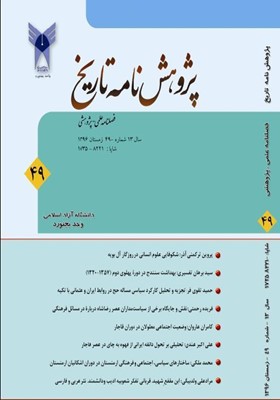شکوفایی علوم انسانی در روزگار آل بویه
محورهای موضوعی : مباحث معرفتی و روش شناختی و تاریخ پژوهیپروین ترکمنی آذر 1 , آمنه نجف زاده 2 *
1 - پژوهشکده تاریخ-پژوهشگاه علوم انسانی و مطالعات فرهنگی-تهران-ایران
2 - پژوهشکده تاریخ-پژوهشگاه علوم انسانی و مطالعات فرهنگی-تهران-ایران
کلید واژه: علوم انسانی, فلسفه, آل بویه, بومیسازی, عقلگرایی,
چکیده مقاله :
هدف این مقاله مشخصکردن جایگاه علوم انسانی و چگونگی رشد و اعتلای آن در حکومت آلبویه میباشد. آلبویه دوره بارزی را در تاریخ ایران رقم زدند. طبقهبندی علوم و حاکمیت جریانات عقلگرا بر جامعه، شرایط مناسبی را برای شکوفایی علمی-فرهنگی پدید آورد و نوآوریها و خلاقیتها با بهرهگیری از قابلیتها و ظرفیتهای موجود، گسترشیافت. آلبویه برای اعتلا و شکوفایی علوم انسانی نیازی به تقلید یا اقتباس نداشتند و کافی بود در کنار بهرهگیری از عناصر و اجزاء متون فلسفی و ترجمهای موجود، به گنجینههای اخلاقی-حکمتی ایران باستان و پشتوانههای خود مراجعه نمایند. دستیابی به این خودآگاهی، موجب مطالعه و بازبینی و نقد آثار موجود، تطبیق آن با دغدغهها و نیازهای جامعه و بومیسازی آنها گردید. در نتیجۀ حمایت حکومت و آزاداندیشی حاکم بر جامعه، متونی ترکیبی و کاربردی پدید آمد که بهکار بستن اصول آن در کنار توصیههای اسلام، زمینهساز اعتلای بینش و بصیرت مردم و سلامت فکری اجتماع گردید. روش این پژوهش، گردآوری دادهها به صورت مطالعات کتابخانهای و بهرهگیری از منابع میباشد و شیوه ارائه مطالب به صورت توصیفی-تحلیلی است.
The purpose of this article is to determine the status of the humanities and how it throve in the reign of Buyids. Buyids made a significant era in the history of Iran. The classification of the sciences and streams of rationalism predominating the society created favorable conditions for scientific-cultural flourishing; and innovations and creativities developed using the existing abilities and capabilities. In order to promote the humanities, Buyids did not need any imitation or adaptation; it was enough to refer to the treasures of ancient Iran in ethics and wisdom as well as using the elements and components of the existing philosophical and translated literature. Acquiring such self-consciousness set the conditions for studying, reviewing and critiquing the existing works and adjusting these works to the concerns and needs of the community and indigenizing them. As a result of the support of the government and the domination of freethinking in the society, mixed texts emerged which were practical and the application of their principles, along with the recommendations of Islam, increased people's insight and sagacity and throve intellectual health of the community. The method of this research is collecting data in the form of library studies and resource utilization. The method of presenting the materials is descriptive-analytic.
_||_

